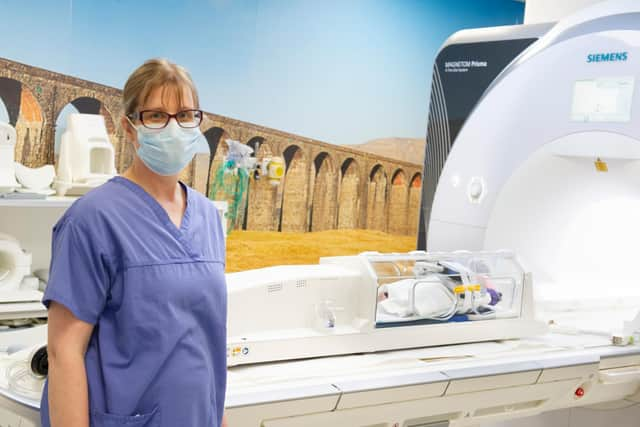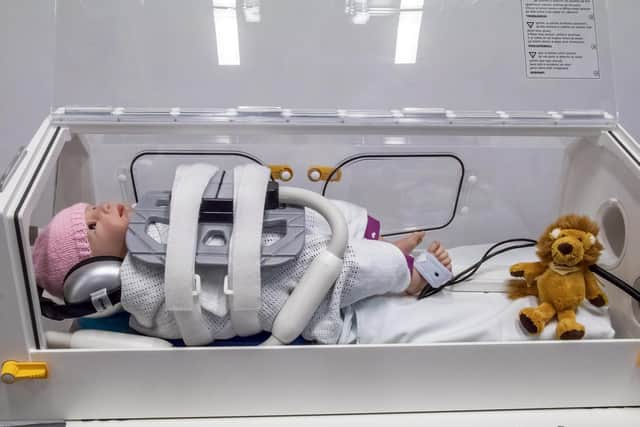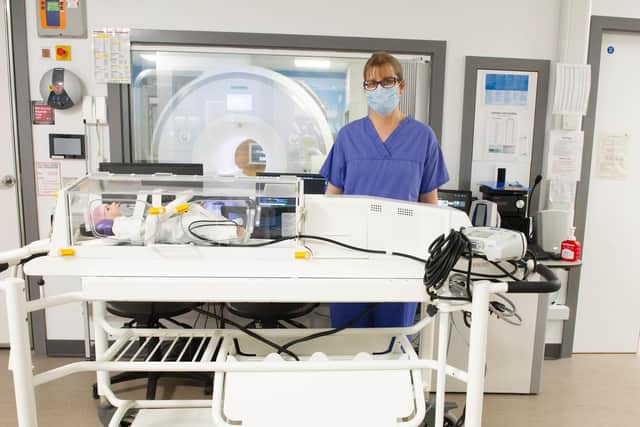Leeds congenital heart unit is first in UK to use new 'baby pod' for revolutionary research
and live on Freeview channel 276
The potentially life-saving ‘baby pod’ has now been installed at the hospital’s congenital heart unit and is being used for groundbreaking research in a joint project between Leeds Teaching Hospitals NHS Trust and the University of Leeds.
It follows a successful fundraising campaign - publicised in the YEP - by city charity the Children’s Heart Surgery Fund (CHSF), along with donations from funders including the Morrisons Foundation, Heart Research UK and Ilkley Round Table.
Advertisement
Hide AdAdvertisement
Hide AdThe city’s leading clinicians now hope the improved data provided by the baby pod - which combines equipment including an MRI coil and the MRI incubator - may give worried parents an earlier diagnosis for their poorly babies and help predict which patients need surgery in the future.


James Oliver, congenital cardiologist and CHSF trustee, said: “This exciting new equipment is revolutionising congenital cardiac MRI.
“For the first time, even our youngest congenital patients can benefit from important research into improving early diagnosis.”
Congenital heart disease is one of the most common types of birth defect, affecting up to eight in every 1,000 babies born in the UK.
Advertisement
Hide AdAdvertisement
Hide AdWhile survival rates have improved, diagnosis and imaging of newborns can be challenging.


Traditionally, CT imaging has often been preferred over MRI for babies, due to its quieter and faster scan times, while MRI can take an hour, needs patients to hold their breath or be sedated, a risky process for poorly babies.
The use of CT, however, requires a radiation dose and produces less detailed data.
But now, using the latest ‘4D flow MRI technology’, this new incubator will also allow babies to be scanned in under ten minutes and thanks to special sound proofing, means babies can be transported from the ward to the MRI department and scanned all while asleep.
Advertisement
Hide AdAdvertisement
Hide AdDr Malenka Bissell, clinical lecturer of paediatric cardiology at the University of Leeds and consultant at Leeds Children’s Hospital, said: “It’s really exciting.


“We are still at the research stage where we’re trying to understand where it will really help but of course ultimately it will mean sick babies need not to have an extra anaesthetic.
“And it will also really help us to learn a lot more about the operations that we are doing and how it changes blood flow. Because we can look at before and after - which we wouldn’t normally have done [because of associated risks].
“The surgeons are really excited about the idea of being able to understand how their different surgical techniques change the blood flow through different vessels.”
Advertisement
Hide AdAdvertisement
Hide AdSharon Milner, CEO of the Children’s Heart Surgery Fund, said: “I must pay tribute to the many trusts, foundations and other funders who helped us purchase this vital technology - thank you for supporting hearts for life.
“This game-changing research will make a huge difference to babies born with heart disease and their families for years to come in our region.”
The MRI baby pod research announcement is the latest feat for the unit after it was last year named as having the UK’s highest surgical survival rates for children.
A report by the National Institute for Cardiovascular Outcomes Research (NICOR) found children who undergo heart surgery in Leeds have better outcomes than anywhere else in the country - with a 99.4 per cent survival rate over a three-year period treating 929 children.
Advertisement
Hide AdAdvertisement
Hide AdLeeds was the only children’s heart surgery unit in the UK to have a survival rate that was in the highest performance category, being ‘much higher than expected’ for units of its kind in the country.
*YEP's Have a Heart campaign
The CHSF has supported the congenital heart unit for over 30 years, since its formation in 1988.
Last year, the Yorkshire Evening Post launched a Have a Heart campaign to help the Children's Heart Surgery Fund (CHSF) reach its £1m target for donations.
CHSF helps fund vital equipment for the unit as well as supporting patients and their families.
Advertisement
Hide AdAdvertisement
Hide AdShortly after the coronavirus pandemic hit, CHSF was forced to issue an urgent plea for donations after losing a "significant portion" of its yearly income.
Support the YEP and become a subscriber today. Enjoy unlimited access to local news and the latest on Leeds United, With a digital subscription, you see fewer ads, enjoy faster load times, and get access to exclusive newsletters and content. Click here to subscribe.